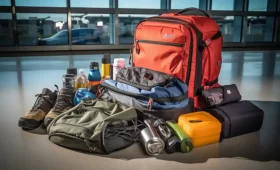
A new and inspiring trend has taken the travel industry by storm – seniors embarking on journeys that rival the adventures of their youth. As older generations embrace the allure of exploration, there’s a growing importance placed on ensuring the safety and well-being of senior travelers.
In this guide, we’ll delve into the world of “Travel Safety for Seniors” and discover the precautions, products, and insights that empower mature travelers to navigate the globe with confidence.
The world of travel is evolving, and it’s not just for the young and restless. Senior travelers are now setting out on voyages, discovering distant landscapes, and immersing themselves in diverse cultures. This rising trend reflects not only a desire for new experiences but also the resilience and vitality that define this demographic.
While travel offers countless opportunities for enrichment, it also presents unique challenges, especially for seniors. These challenges necessitate a focus on travel safety like never before. Ensuring senior travelers can explore without worry is the cornerstone of our guide.
Join us as we explore destinations tailored to senior comfort and needs, discuss vital health preparations, and introduce an array of senior-friendly travel products. We’ll also delve into practical safety precautions, the importance of communication and emergency preparedness, and tips for maintaining health on the road.
At its heart, this guide aims to empower senior travelers to make the most of their adventures, providing the peace of mind that comes from knowing they can explore the world safely and securely.
“Travel Safety for Seniors” is not just a phrase; it’s a commitment to celebrating the spirit of adventure at any age. So, let’s embark on this journey together, ensuring senior travelers can savor every moment of their explorations without a worry in the world.
Choosing Senior-Friendly Destinations
Selecting the perfect travel destination is a crucial first step in ensuring travel safety for seniors. When deciding where to go, there are several important considerations:
- Accessibility: Senior travelers should prioritize destinations that are accessible for individuals with mobility challenges. Look for cities and attractions with ramps, elevators, and well-maintained sidewalks.
- Healthcare Facilities: Consider the availability and quality of healthcare facilities at your chosen destination. Access to medical care can be crucial for seniors, especially those with pre-existing conditions.
- Climate: Be mindful of the climate. Some seniors may have difficulty with extreme heat or cold, so choose destinations with weather that suits their comfort and health.
- Senior-Friendly Attractions: Research senior-friendly attractions, such as museums, parks, and historic sites with easy access and accommodations for older visitors. Some destinations offer senior discounts or free admission for seniors.
- Accommodations: Ensure that the chosen destination provides senior-friendly accommodations. Look for hotels and rental properties with features like grab bars in bathrooms, non-slip flooring, and elevators.
Senior-Friendly Destinations
Several destinations cater to senior travelers exceptionally well:
- Cruise Destinations: Cruises are popular among seniors due to their convenience and accessibility. Choose cruises that offer amenities like handicap-accessible cabins, medical facilities, and senior-focused activities.
- European Cities: European cities like Barcelona, Prague, and Vienna are renowned for their senior-friendly environments, including accessible public transportation and attractions.
- National Parks: Many U.S. national parks, such as the Grand Canyon and Yellowstone, offer accessible trails, visitor centers, and senior discounts.
- Japan: Japan is known for its respect for the elderly, and cities like Kyoto have accommodations designed to cater to seniors’ needs.
- New Zealand: New Zealand’s stunning natural landscapes and senior-friendly amenities make it an excellent choice for older travelers.
Selecting destinations like these can significantly enhance the travel experience for seniors. These locations offer a combination of accessibility, healthcare facilities, and accommodations designed with seniors in mind, ensuring a memorable and safe journey.
Health Preparations for Senior Travelers
Travel safety for seniors hinges on thorough health preparations. Here’s a closer look at the key aspects of preparing for a safe and healthy journey:
Pre-Travel Health Assessments
Before embarking on any trip, senior travelers should consider comprehensive health assessments. These evaluations can help identify and address any existing health conditions or concerns that might be exacerbated during travel. The importance of health assessments includes:
- Identifying Potential Risks: Assessments can uncover conditions that might pose a risk during travel, such as heart problems, diabetes, or respiratory issues.
- Medication Adjustments: For those on prescription medications, evaluations can ensure that dosages are correct and that there won’t be any adverse effects while traveling.
- Vaccination Status: Evaluations can help determine if additional vaccinations or booster shots are necessary based on the travel destination.
Vaccinations and Medications
Immunizations and proper medications play a vital role in ensuring senior travel safety:
- Routine Vaccinations: Ensure that routine vaccinations, such as flu and pneumonia vaccines, are up to date before traveling.
- Travel-Specific Vaccinations: Research the recommended or required vaccines for your travel destination. For instance, some regions may necessitate vaccinations against diseases like yellow fever or typhoid.
- Prescription Medications: Seniors should carry an adequate supply of their prescription medications. It’s essential to keep these medications in their original packaging, with clearly labeled dosages. Carry a copy of the prescriptions as well.
- Travel Health Kit: Assemble a travel health kit that includes essentials like pain relievers, antidiarrheal medication, and a basic first-aid kit. Having these items on hand can help seniors address common health issues while traveling.
Travel Insurance for Health Coverage
Securing travel insurance is a non-negotiable aspect of senior travel safety. Travel insurance can provide critical coverage in case of emergencies, including:
- Medical Emergencies: In the event of a health crisis or accident, travel insurance can cover medical expenses, including hospital stays and treatment.
- Emergency Evacuations: Some policies offer coverage for emergency evacuations to the nearest suitable medical facility.
- Trip Interruptions or Cancellations: Travel insurance can reimburse expenses if a senior traveler has to cut their trip short due to health issues.
When purchasing travel insurance, it’s important for seniors to disclose their pre-existing conditions to ensure they have adequate coverage. Having the right travel insurance can provide peace of mind and financial protection, making it an essential component of senior travel safety.
Senior-Friendly Travel Products
When it comes to ensuring travel safety for seniors, having the right travel products can make a world of difference. These essential items are designed to enhance both safety and comfort for senior travelers:
Walking Aids
- Folding Canes: These lightweight and compact canes provide stability for seniors who may require a bit of assistance with balance. Folding canes can be easily stowed in a carry-on or checked luggage.
- Walker with Wheels: A walker with wheels and a seat offers seniors the option to take a rest whenever needed. It’s a versatile walking aid, providing support and convenience for long days of exploration.
Mobility Scooters
- Travel-Friendly Mobility Scooters: Collapsible or foldable mobility scooters are ideal for senior travelers who have difficulty walking long distances. These scooters can be disassembled for transport and reassembled at your destination.
- Lightweight Power Chairs: Some seniors may prefer lightweight power chairs for added mobility. These chairs offer a good balance between portability and comfort.
Hearing Aids
- Wireless Hearing Aids: Modern hearing aids come equipped with wireless technology, making it easier for seniors to connect to audio devices, such as smartphones or in-flight entertainment systems. This ensures they can hear important announcements and enjoy entertainment during travel.
- Noise-Canceling Headphones: Alongside hearing aids, noise-canceling headphones can be invaluable for seniors. They help reduce ambient noise during flights or in crowded places, making it easier for seniors to communicate and stay comfortable.
Portable Oxygen Concentrators
For seniors with respiratory conditions, portable oxygen concentrators are a lifeline. These devices provide a continuous supply of oxygen and are FAA-approved for air travel. They allow seniors to enjoy travel while managing their health needs.
Medication Management Devices
- Pill Organizers: Travel-sized pill organizers with multiple compartments are essential for seniors who need to take several medications. They help ensure the right doses are taken at the right times, even while on the go.
- Medication Reminder Devices: Some seniors benefit from electronic medication reminder devices. These gadgets beep or display alerts when it’s time to take a dose, helping to avoid missed medications during travel.
Luggage with Built-In Features
Luggage designed with senior travelers in mind offers additional features for convenience:
- Spinner Wheels: Luggage with spinner wheels makes it easier for seniors to maneuver their bags, reducing the physical effort required.
- TSA-Approved Locks: Built-in TSA-approved locks provide added security and ease when going through airport security.
- Ergonomic Handles: Luggage with ergonomic handles reduces strain on the wrists and shoulders, making it more comfortable to pull or carry.
These senior-friendly travel products are crucial for enhancing safety, mobility, and overall comfort during trips, ensuring that senior travelers can fully enjoy their adventures while minimizing potential challenges.
Safety Precautions During Travel
Ensuring the safety of senior travelers involves a combination of preparation, vigilance, and awareness. Here are some crucial safety precautions to consider:
Navigating Airports and Public Transportation
- Early Arrival: Arrive at the airport well in advance to allow time for security checks and to reduce any stress associated with rushing.
- Assistance Services: Many airports offer assistance services for seniors, including wheelchair assistance, priority boarding, and escort services. Take advantage of these services.
- Secure Your Belongings: Keep important documents, such as passports, boarding passes, and medications, in a secure, easy-to-reach location. Consider a travel pouch that you can wear under your clothing.
- Mobility Assistance: If you have mobility issues, notify the airline or airport in advance. Airlines can provide wheelchair assistance and ensure you have priority boarding.
- Medical Documentation: Carry a copy of your medical records and a list of emergency contacts. Inform your travel companion or a fellow traveler about your medical conditions and any allergies.
- Stay Hydrated and Comfortable: Dehydration can exacerbate health issues, so drink plenty of water during your journey. Wear comfortable clothing and shoes suitable for walking.
Safety Precautions During Hotel Stays and Excursions
- Hotel Selection: Choose accommodations with safety features like 24/7 concierge services and well-lit corridors. Requesting a room on a lower floor if using elevators is a concern.
- Excursion Safety: When booking excursions or tours, communicate your specific needs to tour operators. Verify that they can accommodate your requirements, such as wheelchair accessibility.
- Emergency Plan: Familiarize yourself with the hotel’s emergency evacuation plan. Check for exits and the location of fire extinguishers and alarms.
- Safe Storage: Use the hotel safe to store valuable items and travel documents when you’re not using them. Consider a portable travel safe for extra security.
- Assistance Devices: If you use mobility aids or hearing aids, ensure you have them with you at all times. Have a backup battery or charger as needed.
- Medication Security: Keep your medications secure and follow your regular schedule. If you need to keep medications refrigerated, communicate this to the hotel staff.
Staying Vigilant and Aware
- Situational Awareness: Be mindful of your surroundings, especially in crowded or unfamiliar places. Stay alert to potential risks or distractions.
- Travel Companions: If traveling alone, keep in touch with a trusted person who knows your itinerary and can check in on you.
- Local Emergency Numbers: Familiarize yourself with local emergency contact numbers and the nearest medical facilities at your destination.
- Local Customs and Laws: Research the local customs and laws of your travel destination to ensure you are respectful and compliant.
- Scams and Frauds: Be cautious about sharing personal information and financial details. Be aware of common travel scams and how to avoid them.
- Travel Insurance: Purchase comprehensive travel insurance that includes medical coverage and covers trip cancellation or interruption due to unforeseen events.
By following these safety precautions, senior travelers can enjoy their journeys with confidence and peace of mind, reducing the likelihood of potential issues and ensuring a safe and enjoyable travel experience.
Communication and Emergency Preparedness
Effective communication and emergency preparedness are crucial for the safety and well-being of senior travelers. Here’s how these precautions can ensure a quick response in case of emergencies:
Significance of Communication Devices
- Mobile Phones: Ensure you have a fully charged mobile phone with you at all times. Make sure you have the contact information of your travel companions, local contacts, and the nearest embassy or consulate.
- Travel-Specific Apps: Download travel-related apps that can assist in emergencies, such as translation apps, local emergency service apps, and navigation apps. These can be invaluable when seeking assistance.
- Global Positioning System (GPS): Use a GPS app or device to help you navigate and pinpoint your location, especially when exploring unfamiliar destinations.
- Emergency Communication Devices: Consider carrying an emergency communication device like a satellite phone or a personal locator beacon (PLB) if you’re going to remote areas with limited cell coverage.
Emergency Contact Lists and Medical Information
- Emergency Contact List: Prepare a list of emergency contacts, including family members, close friends, and the contact information of your travel companions. Share this list with your fellow travelers.
- Medical Information: Create a document with your medical history, including pre-existing conditions, allergies, and current medications. Keep a digital and printed copy with you at all times.
- Travel Insurance: Make sure you have comprehensive travel insurance that covers medical emergencies and evacuation. Carry proof of insurance with you, including contact information for the insurance provider.
- Identification: Carry identification such as your passport, driver’s license, or a copy of your birth certificate. Also, have your medical insurance card and any relevant membership cards (e.g., AARP).
- Emergency Services: Research the local emergency services and their contact information at your destination. Know how to dial local emergency numbers if necessary.
Quick Response in Emergencies
- Swift Communication: Having your mobile phone and a list of contacts readily accessible ensures you can quickly communicate your situation in emergencies.
- Medical Information: Emergency responders and healthcare providers can make better-informed decisions with access to your medical information, leading to more effective and efficient care.
- Coordination: Having a communication plan and knowing how to access local emergency services can facilitate a coordinated response to any emergency.
- Peace of Mind: Being well-prepared for emergencies provides peace of mind, reducing anxiety and fear in unexpected situations.
- Insurance Assistance: In case of medical emergencies, travel insurance can help with expenses and coordination of care, including medical evacuation if necessary.
By prioritizing communication and emergency preparedness, senior travelers can minimize risks and maximize their safety during their journeys. Whether it’s a minor inconvenience or a serious emergency, being prepared allows for a swift response and a higher chance of a positive outcome.
Staying Healthy While Traveling
Traveling can be a wonderful adventure for seniors, provided they take measures to stay healthy and enjoy their trip to the fullest. Here’s a comprehensive guide to maintaining health during the journey:
Advice on Maintaining Health
- Consult Your Doctor: Before embarking on a trip, schedule a visit to your healthcare provider. Discuss your travel plans, any pre-existing medical conditions, and ensure your vaccinations are up to date.
- Pack Medications: Carry an ample supply of your prescription medications, and pack them in their original labeled containers. It’s advisable to bring extra medication in case of travel delays.
- Insurance Coverage: Ensure you have comprehensive travel insurance that covers medical emergencies. Familiarize yourself with the policy, including what to do in case of a health-related incident.
- Medical Records: Carry a summary of your medical records, including allergies, current medications, and a list of emergency contacts. This information can be invaluable in the event of a medical issue.
- Hydration: Stay well-hydrated, especially in warm or dry climates. Carry a reusable water bottle and drink regularly, even if you don’t feel thirsty.
Importance of Hydration and Nutrition
- Balanced Diet: Consume a well-balanced diet rich in fruits, vegetables, and whole grains. Opt for local, fresh foods to experience the local cuisine while maintaining nutrition.
- Limit Alcohol: While it’s fine to enjoy a drink occasionally, it’s essential to limit alcohol consumption, as it can lead to dehydration and impair judgment.
- Supplements: Depending on your diet and destination, you may consider taking supplements, especially for vitamins like C and D.
Avoiding Common Health Issues
- Jet Lag: When crossing multiple time zones, ease into the new schedule gradually. Get plenty of rest before the trip, and try to adapt to the local time as soon as you arrive.
- Deep Vein Thrombosis (DVT): On long flights or car journeys, practice in-seat exercises and take short walks to prevent DVT. Compression stockings can also help.
- Traveler’s Diarrhea: Be cautious about what you eat and drink. Avoid tap water and ice in regions with questionable water quality, and choose cooked, hot meals over raw or uncooked food.
- Sun Protection: Protect yourself from the sun by wearing a wide-brimmed hat, sunglasses, and using sunscreen. Seniors are often more vulnerable to sunburn, so extra care is needed.
- Local Health Precautions: Research your destination’s health precautions and any endemic diseases. Discuss any necessary vaccinations with your healthcare provider.
- Walking and Balance: Be mindful of walking on uneven terrain or slippery surfaces. Use walking aids if necessary and choose comfortable, supportive footwear.
- Rest: Don’t overexert yourself. Plan rest periods during your activities and avoid rushing from one place to another.
By following these guidelines, senior travelers can safeguard their health and well-being while enjoying their journey. Good health is the key to making the most of every travel experience.
Senior Travel Group Tours and Travel Companions
Traveling in a group or with a trusted companion can significantly enhance the safety and enjoyment of senior travelers. Here’s an in-depth look at the benefits:
Benefits of Group Tours for Seniors
- Safety in Numbers: Group tours provide a sense of security, especially in unfamiliar destinations. Seniors can find comfort in the presence of fellow travelers and a knowledgeable tour guide.
- Access to Expertise: Many group tours come with experienced guides who can provide historical and cultural insights, answer questions, and offer assistance. This enriches the travel experience.
- Pre-Planned Itineraries: Group tours typically have well-organized itineraries, sparing seniors the need to plan every detail. This reduces stress and allows for a more relaxed journey.
- Social Interaction: Traveling in a group offers ample opportunities for social interaction and forming new friendships with like-minded individuals. Loneliness is less likely on group tours.
- Cost-Effective: Group tours often provide better rates on accommodations, transportation, and entrance fees due to bulk bookings. This can be budget-friendly for seniors.
Advantages of Traveling with Companions
- Emotional Support: Traveling with a friend, family member, or companion can provide emotional support, especially during moments of stress or homesickness.
- Shared Responsibilities: Companions can help with tasks such as carrying luggage, navigating unfamiliar terrain, and decision-making. This reduces the burden on individual travelers.
- Safety Net: In case of an emergency or health issue, having a companion nearby can be crucial. They can provide assistance, contact authorities, or seek medical help.
- Mutual Enjoyment: Sharing experiences with a companion enhances enjoyment. Laughing at a funny incident or admiring a breathtaking view together creates lasting memories.
- Personalized Experiences: Traveling with a companion allows for flexibility in the itinerary. Seniors can explore specific interests and adjust plans to their preferences.
How Group Travel Enhances Senior Safety
- Group Support: The presence of fellow travelers adds a layer of security. Seniors can watch out for one another and offer assistance if needed.
- Tour Guide Knowledge: Many group tours are led by experienced guides who are well-versed in safety protocols. They can navigate unforeseen challenges and offer advice in emergencies.
- Local Expertise: Guides often have local knowledge and can guide seniors to safe areas and away from potential hazards.
- Emergency Response: In the event of a medical emergency, group tours are equipped to handle the situation. They can quickly contact local medical services and assist seniors.
- Peace of Mind: Knowing that help is readily available in a group setting provides peace of mind. Seniors can enjoy their journey without excessive worry.
In summary, both group tours and traveling with companions offer invaluable benefits to senior travelers. These approaches enhance safety, foster social connections, and create a more enjoyable and stress-free travel experience.
Conclusion
In the realm of travel, age should never be a barrier to adventure. Senior travelers, like all explorers, have a world of opportunities waiting to be discovered. The key to embarking on safe and memorable journeys lies in preparation, caution, and, most importantly, the right products and precautions.
Traveling as a senior can be incredibly rewarding, and we’ve delved into the essentials for ensuring a secure and enjoyable voyage. From choosing the right destination to staying healthy, we’ve covered the vital aspects of travel safety for seniors.
Remember, the increasing trend of seniors exploring the world is a testament to their resilience, curiosity, and zest for life. The golden years are the perfect time to tick off those bucket-list destinations, learn about different cultures, and create cherished memories.
Safety should always be a priority, but it shouldn’t deter senior travelers from pursuing their travel dreams. Through careful planning, health considerations, and the use of travel safety products, seniors can journey with confidence. Whether it’s a group tour, a companion adventure, or a solo exploration, there’s a world of experiences waiting.
So, to all our senior travelers, we encourage you to set forth on your next adventure with your focus on enjoying every moment. May your travels be filled with laughter, awe-inspiring sights, and cultural enrichment. Remember the focus keyword and let it be your mantra: “Travel Safety for Seniors.”
Now, equip yourselves with the right products, take necessary precautions, and go forth to explore, experience, and embrace the beauty of the world, because the world is indeed your oyster, no matter your age. Safe travels and bon voyage!


